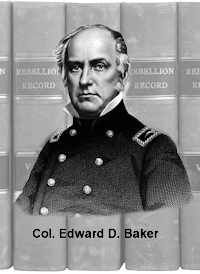 March 24 — This morning at daylight we hear the deep boom of a cannon in the direction of Kernstown, which plainly indicated that the Yanks were out early Rebel hunting, shelling the road as they cautiously advanced, searching for ambuscades or masked batteries, of both of which they seem to be most awfully afraid, consequently their advance guard is never without a battery in close proximity to shell every suspicious thicket along the road that might hide a Rebel.
March 24 — This morning at daylight we hear the deep boom of a cannon in the direction of Kernstown, which plainly indicated that the Yanks were out early Rebel hunting, shelling the road as they cautiously advanced, searching for ambuscades or masked batteries, of both of which they seem to be most awfully afraid, consequently their advance guard is never without a battery in close proximity to shell every suspicious thicket along the road that might hide a Rebel.
At about nine o’clock they came in sight. We moved about a mile south of Newtown, went in battery and fired on their vanguard. As usual, they had the indispensable battery in front and returned our fire forthwith. At this position we had a lively and stubborn artillery duel. We held our own until we saw that the Yankee army as a whole was advancing. Then we withdrew to the next hill and opened on them again, and so we skirmished with their artillery and devilled their advance from every hilltop until we arrived on the Shenandoah side of Cedar Creek. There we found Jackson’s infantry and wagon train in camp, but were preparing to move up the Valley. The Yanks charged one of our guns to-day, but found that the fire was a little too warmish and dangerous to accomplish the capture of a live Rebel gun. The Yanks have no relish for canister.
We took the same position at Cedar Creek that we had on the 18th, and the Yanks put their battery in the very same place that they had it in then, and judging from the accuracy of their fire and the precision with which their shell exploded just at the intended point and time, I am almost certain that it was the same battery that fought us before from that position. It was a very short time after we went in battery until the Yanks were ready to open fire on us. However, the opening fire of both batteries was simultaneous. The fire was severe. Their shell exploded all around us, and some of them too near to feel good or to be agreeable and consistent with a healthy body, sound limbs, and whole bones.
While we were firing, Jackson’s wagons and infantry, which were just in rear of our position, however not in sight of the enemy’s battery, moved out on the pike and started up the Valley. Then the Twenty-Seventh Virginia Infantry moved out and halted a few moments on the pike in our rear, and right in range of the Yankee battery that was firing on us. A shell that was directed at our guns oversped its intended mark and exploded in the regiment. It killed and wounded some five or six men. One man, a member of the Rockbridge Rifles, still lay in the road when we retired from our position. He had his leg cut nearly off above the knee, and his trousers, which had been ignited by the explosion of the shell, were slowly burning. I suppose his comrades were a little excited, or else perhaps had no way to take him along, and had left him in the critical condition that I found him. I extinguished the fire and lifted him out of the road and put him in a seemingly easy position against the fence. When I was about leaving him he handed me his rifle, with the remark, “Here, take my gun and don’t let the Yankees have it.”
True and sincere patriotism of such quality as that, manifested under such trying and painful circumstances, ought to merit the lasting commendation of a grateful country. He thought then, and so did I, that he would fall into the hands of the enemy, as we were rear guard, and there was nothing between his fence corner and the Yanks to prevent his capture. But I learned this evening that after I left him some one went back with an ambulance and brought him away. After Jackson’s men had all moved away and were out of sight we retired and fell back to Woodstock. Quartered in the Court House.



